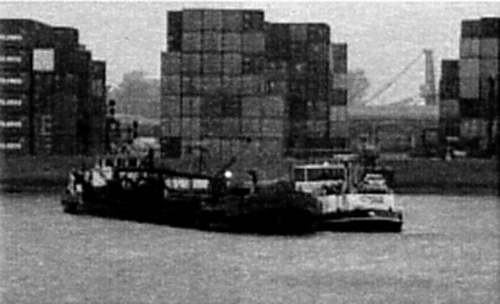
Transportation Focus
Newsletter of the Rahall Transportation, Institute
Fall 2006

Container ships from all over the world unload their products onto barges' at the Port of Rotterdam, Robertson said.
Dana Robertson, director of the National Maritime Enhancement Institute, participated in the SmartRivers 2006 Conference in Brussels, Belgium, Nov. 7, 2006.
SmartRivers 2006, an international joint conference on synergies for an efficient waterway system in Europe and the United States, was attended by 90 personnel representing industry and government organizations affiliated with inland marine navigation.
Robertson participated in a panel, which consisted of European and American maritime professionals, that identified future areas for collaboration between partners from the United States and Europe.
Key subjects discussed during the conference included:
• Presentation of the European Common Transport Policy and the importance of American-European partnership in transport;
• Institutional challenges to improving United States' Waterways;
• The United States' role in inland waterway transportation;
• Viewpoints of the shipping industry from the United States and Europe;
• Need for understanding the social and environmental benefits of inland waterway transportation;
• Development of partnerships and creating "win-win": situations in waterborne transportation and;
• Developing strategies for an efficient water system in Europe and the US.
Robertson said, "It is evident Europe has recognized the value of the inland waterways towards easing congestion on crowded highways and railways.
"Container ships from all over the world unload their products onto barges at the Ports of Rotterdam and Antwerp, and from there they are transported to intermodal facilities throughout the length of the Rhine and Danube Rivers. Environmental organizations support the use of the inland waterways because they recognize that shipping by barge is an environmentally friendly mode of transportation."
Robertson said Americans can learn to alleviate highway and rail congestion problems by utilizing inland waterways, but there are challenges to using intermodal transportation that must be addressed.
"American attendees learned that transferring the containers from ocean-going container ships to rail, road or barges for distribution to their final destination is a great challenge. The intermodal system must ensure containers are rapidly and efficiently shipped from the port en route to their final destination. Short sea shipping is an increasingly important mode for the large-scale transport of freight within Europe, whether freight is dry bulk, containers, automobiles, other general cargo or project cargo."
American attendees visited the Port of Brussels and Port of Antwerp, Belgium; the Port of Rotterdam, Netherlands; the Port of Mannheim, Germany; and the Strepy Thieu Lift in Belgium.
SmartRivers 2006 was organized by the European Federation of Inland Ports, Brussels, Belgium, in collabation with the Port of Pittsburgh, Transport Infrastructure Needs Assessment (TINA) Vienna, Austria and Via Donau, Vienna, Austria. Attendees plan to work on joint issues between now and the next conference in 2007.
"We left the conference with the knowledge that together, we can better address these issues," Robertson said.